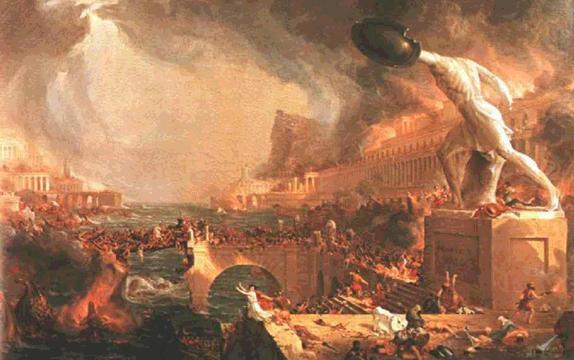Jerome, Augustine and the Fall of Rome
 Thursday, June 19, 2014 at 03:36PM
Thursday, June 19, 2014 at 03:36PM 
(Published here with the kind permission of Modern Reformation Magazine, Issue: "Zion" Nov./Dec. 2009 Vol. 18 No. 6 Page numbers: 25-28)
When an alien spaceship destroyed the White House in the 1993 science fiction film Independence Day, I'm told that pre-9/11 moviegoers were not horrified at the possibility and that some even cheered (perhaps because they were a bit cynical about the current occupant of the Oval Office). As the world's lone superpower, we believe there is no nation on earth that would dare invade our nation and occupy our territory. While terrorists may do great damage and cause huge loss of life (as they have done), from a strategic point of view, a terrorist strike is of little consequence when it comes to challenging the military and economic might of the United States. At this point in our history, the fall of the American Republic to a foreign adversary (space aliens aside) is unthinkable.
Similarly, the citizens of the Roman Empire once thought themselves invincible and therefore safe from invasion. That is, until a Visigoth general named Alaric led an army of Germanic tribes over the Alps into northern Italy. The audacity of Alaric's incursion into the heartland of the Roman Empire enabled him to quickly occupy much of northern Italy, before laying siege to the rest of the Italian peninsula to the south. It was not long before Alaric's army was outside the gates of the City of Rome. When Alaric's forces broke through the Eternal City's remaining defenses on August 24, A.D. 410, his men ransacked and looted the symbolic heart of the empire. Ironically, this "barbarian" army included a significant number of Arian Christians who did little damage to the churches in the city and minimal harm to orthodox Christians.
Spared from invasion for eight hundred years, the unthinkable had now happened: Rome had been sacked. How on earth did an army of barbarians pull off the impossible? History had come to a dramatic turning point, and everyone living at the time seemed to know it, even if they were not sure what this meant for their collective futures.
If Edward Gibbon's assessment is correct, the myth of Roman invincibility obscured the moral and economic rot (what Gibbon calls the loss of "civic virtue") that had eaten away much of the foundation of Roman society. Rome's battle-hardened armies were off guarding the far-flung territories of the empire. The empire's treasury was empty; and a government, which prided itself on providing both bread and entertainment for its citizens, had nothing left to give them when the barbarians finally came. In the wake of the unthinkable, all that remained was the blame game-how and why did the invincible empire come to such an ignominious end?
The purpose of this essay is to briefly consider how the Fall of Rome provoked different reactions from two prominent church fathers living at the time: St. Jerome and St. Augustine. Their response to Rome's fall serves as an object lesson for many American Christians, who may see the health and success of the American Republic as in some way connected to the success and vitality of the kingdom of God.
To read the rest of this article, click here: Jerome, Augustine and the Fall of Rome


Reader Comments (7)
(1.) "PREPARING THE CHRISTIAN CHURCH FOR AMERICA'S COMING DESTRUCTION."
(2.) "AMERICA'S COMING DESTRUCTION DOES NOT SIGNAL "THE GREAT TRIBULATION" OR THE 2ND COMING IS AT HAND."
(3.) "WHY GOD DESTROYED AMERICA - TO SAVE THE AMERICAN CHURCH."
(4.) "WHY WHAT HAPPENS TO AMERICA IS NOT IMPORTANT TO GOD AS IT RELATES TO THE WORLDWIDE BODY OF CHRIST."
America's coming demise is going to be the greatest thing that ever happened to Dispensationalism!
Dude, calm down! Take a deep breath and count to ten.
Most articles dealing with church history don't quote from Scripture, I'm not a "dominionist" nor a preterist and I doubt anyone who actually reads my work will be able to accuse me of promoting a gospel of "narcissism." Furthermore, the regular readers of this are any but mindless disciples.
You are welcome to post here if you disagree, but people who rant about things about which they have no clue, don't fare very well.
I've read the letters that Jerome and Augustine exchanged amongst themselves. They reveal something about the personalities of these two ancient theological giants.